S3;E12
~ November 30, 1970
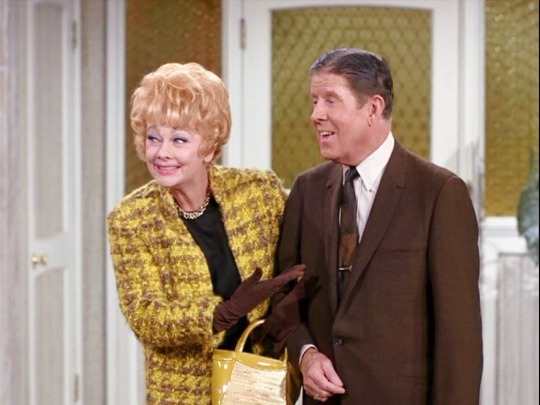

Directed
by Coby Ruskin ~ Written by David Ketchum and Bruce Kelly
Synopsis
Famous
crooner Rudy Vallée
is waiting tables to pass the time until his music comes back into
style. Lucy convinces Kim to help update his look and sound while
Harry gets him a booking at the local teen hangout.
Regular
Cast
Lucille
Ball (Lucy
Carter), Gale
Gordon (Harrison
Otis Carter), Lucie
Arnaz (Kim
Carter)
Desi
Arnaz Jr. (Craig
Carter) does not appear in this episode, although he does receive
opening title credit.
Guest
Cast
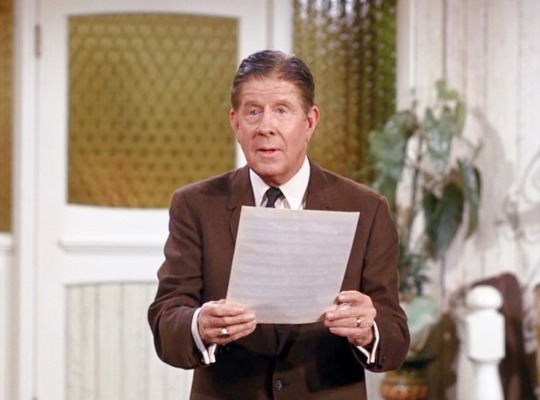
Rudy
Vallée
(Himself) started his career as a saxophone player and singer and
became a popular bandleader, hosting a hit radio program in the
1930s. His first film was 1929’s The
Vagabond Lover.
He also wrote a popular song of the same title. He was known as a
crooner, and often depicted singing through a megaphone. On Broadway
he appeared in How
To Succeed in Business Without Really Trying
and repeated his role in the film version in 1967. That same year he
played “Batman” villain Lord Marmaduke Fogg. Vallée
played himself in “Lucy Takes a Cruise to Havana,” the first episode of
“The Lucy-Desi Comedy Hour” in 1957. He died in 1986 at age 84.

Herbie
Faye
(Luncheonette Manager) was a character actor whose first major role (at age 56) was Corporal Sam Fender in
“The
Phil Silvers Show” (1955).
He also appeared with Silvers on Broadway in Top
Banana
(1951) and also did the film version (1954) with Silvers. He appeared
in a 1968 episode of “The Lucy Show.” This is the first of his
four “Here’s Lucy” episodes.

Phil
Vandervoort
(Steve) appeared in two episodes of “The Lucy Show” where he met
Lucie Arnaz. The two were married from 1971 to 1977. This is the
first of his three episodes of the series.
It
is fairly obvious that Vandervoort, then Lucie Arnaz’s fiancée, was
cast to fill in for the absent Desi Arnaz Jr. Also, a character
named Steve had already appeared on the series played by Steve March.
It is unclear whether this is a recasting or a different character
named Steve.
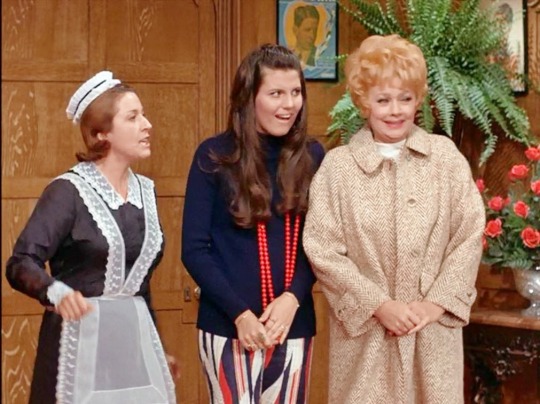
Vanda
Barra
(Rudy Vallée’s
Maid) was
Lucille Ball’s cousin-in-law and married to frequent day player Sid
Gould. This is just one of her over two dozen appearances on “Here’s
Lucy” as well as appearing in Ball’s two 1975 TV movies “Lucy
Gets Lucky” (with Dean Martin) and “Three for Two” (with Jackie
Gleason). She was seen in half a dozen episodes of “The Lucy Show.”
Off-camera background singers are Marnelle
Wright, Gloria Wood, George Bledsoe, Thomas D. Kenny, Mack McLean, and
Sue Allen.
The
diners in the luncheonette, patrons of the Hungry Hippie, and Steve’s
band are all played by uncredited background performers.
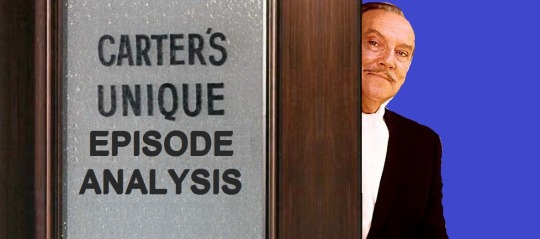

The first draft of the script was date May 25, 1970. It was originally titled “The Rudy
Vallée
Show”.

Interestingly, Lucy read the script and made notes aboard United Flight #196 on June 6, 1970 and made extensive notes about how to ‘fix’ it.

Two days after this episode originally aired (December 2, 1970), Lucie and Desi Jr. appeared on NBC’s “The Kraft Music Hall” with Robert Young and Jane Wyatt hosting. Lucille Ball does not appear.

This
is the first of 68 episodes directed by Coby
Ruskin.
He previously directed episodes of “Gomer Pyle” and “The Andy
Griffith Show,” both filmed at Desilu. Ruskin was hired after
Herbert Kenwith decided to leave the show after an incident between
Lucille Ball and guest star Ruth McDevitt.

According
to Lucille Ball, Rudy Vallée
had the foulest mouth of anyone she’s worked with and was very
difficult while filming this episode.
He
would blame every person around him for anything he couldn’t do. If
he made a mistake, it was always somebody else’s fault. On the DVD
introduction to the episode, music director Marl Young confirms this opinion.
Vallée
was well-known in Hollywood for being difficult to work with and to
work for, often referred to as a “slave driver.”
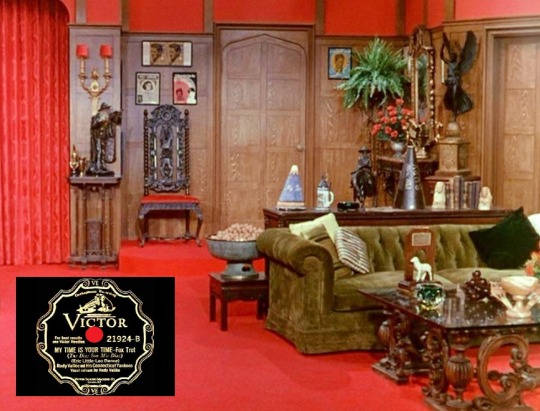
When
Harry asks Vallée
(who is waiting tables) if he’s busy, Vallée
responds “My
time, is your time.”
This was also the title of a song
recorded by Rudy Vallée and His Connecticut Yankees in 1929.
This
was
the theme song
of “The
Fleischmann’s Yeast Hour” for
many years, and it is heavily associated with that show. When Lucy
and Kim visit Vallée’s
home, the doorbell plays the first five notes of the song.
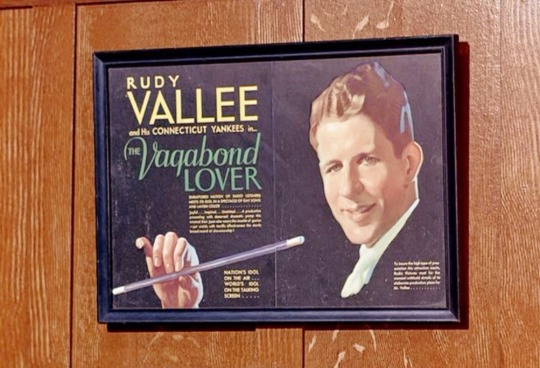
To
prove his identity to Lucy and Harry, Vallée
sings
“I’m
just a vagabond lover.”
The song was written by
Vallée
and Leon Zimmerman for
the 1929 film The
Vagabond Lover.

Vallée
says
he was “the
Tiny Tim of the roaring ‘20s!”
The soundtrack then plays “Tiptoe Through the Tulips.” This is
one of many references to “Rowan and Martin’s Laugh-In” and the
third to reference singer Tiny
Tim,
an eccentric ukulele player with a similar crooner style who appeared
regularly on the program and made the 1929 song popular again.

When
Vallée
says “Hi
Ho”
(his signature greeting) to Kim, she guesses he is the Lone
Ranger.
The Lone Ranger was a masked avenging cowboy who appeared on radio,
in movie serials, and on television.
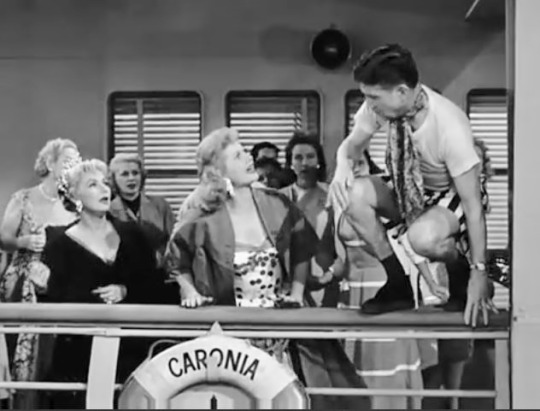
Lucy:
“Oh,
this modern generation! Some of them don’t even know who Bing Crosby
is!”
Vallée:
“Who’s
Bing Crosby?”
Vallée
and
Bing Crosby
were rival crooners during the 1930s. In “Lucy Takes a Cruise to
Havana” (1957, above) Lucy Ricardo tells Vallée
she was a member of his fan club but her friend Susie MacNamara (Ann
Sothern, left) was trying to recruit her as a Crosby fan instead.

When
asked by Vallée
what songs she knows, Kim mentions “Octopus’s Garden,”
“Polythene Pam,” and “Mean Mr. Mustard.” All of these are
Beatles
songs
from 1969. Coincidentally, the day this episode was first aired
former Beatles member George Harrison released
his triple album set All
Things Must Pass.

Kim,
Steve, and the band perform “She
Came In Through the Bathroom Window”
by the Beatles. Vallée
also takes a stab at the song which prompts Kim to say “I’ve
never heard it sung quite that way before.”

Considering
Lucy’s infatuation with diamonds demonstrated in “Lucy Meets the
Burtons” (S3;E1) and “Lucy and the Diamond Cutter” (S3;E10), it
seems an opportunity lost not to mention or perform the Beatles’ 1967
hit “Lucy in the Sky with Diamonds.” Ah, well.
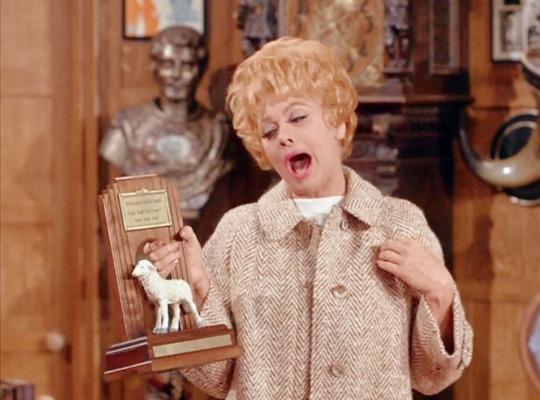
The
set for Vallée’s
home was decorated with items brought in from Vallée’s
private collection, including a Wiffenpoof Trophy and a small red
megaphone with a letter “Y” on it. Both of these were likely
given to him by Yale
University,
home of the Wiffenpoofs.
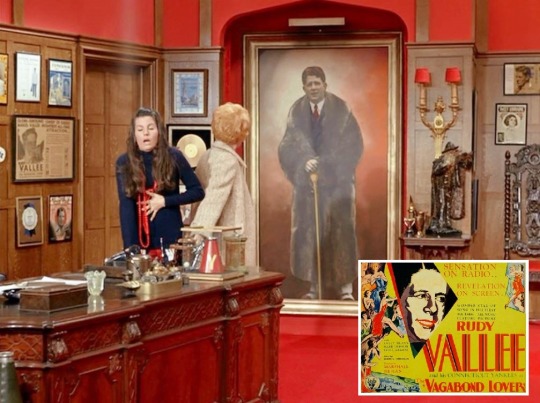
When
the full length portrait of Vallée
in a raccoon
coat
is revealed, Vallée
says he wore the coat in his first picture, Varsity
Hero.
In reality, Vallée’s
first film (aside from two shorts playing himself) was The
Vagabond Lover
in 1929. Vallée
himself was not a fan of the film. In a 1980 interview, he mused
“They’re
still fumigating the theaters where it was shown. Almost ruined me.
In fact, I think it’s only shown in penitentiaries and comfort
stations.”

Performing
with Lucy and Kim at the Hungry Hippie, Vallée
sings a traditional version of “The Wiffenpoof Song” that morphs
into an up-tempo rendition.

The 1909 song was the signature tune of the
Yale University a capella singing group. Vallée
did not have a hit with it until 1937.

He then segues into “Let
the Sun Shine,” a song from the 1967 rock musical Hair.
The number then becomes a medley with the addition of “Winchester
Cathedral,” a 1966 song by The
New Vaudeville Band,
a British novelty group.
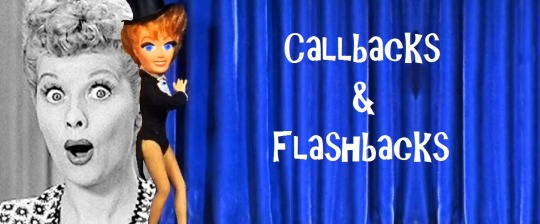

The
statue of the bearded and caped man was also seen decorating Jack
Benny’s home in the previous episode.

Craig
also wore a raccoon coat in “Lucy, the Co-Ed” (S3;E6) and Fred
Mertz wore one in “Lucy
Has Her Eyes Examined” (ILL SE;E11).
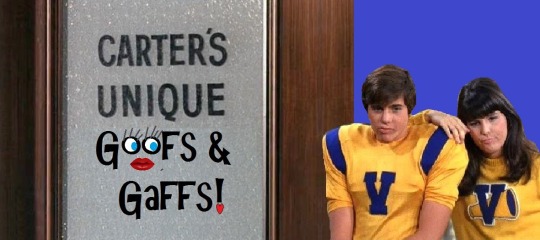
Time Warp! Rudy
Vallée
says
that his style of music is bound to come back into style in 40 or 50
years time. As of this writing it has been 50 years since he spoke
those words. Any day now…
Birds of a Feather! Kim
mentions a song called “Tennessee Walking Bird” but she probably
means “Tennessee Bird Walk,” a 1970 novelty song by Jack
Blanchard and Misty Morgan that hit #1 on the Billboard Country
Charts.

“Lucy and Rudy Vallée” rates 2 Paper Hearts out of 5
This
episode attempts to continue the “generation gap” themes of the
series so that’s a plus. The sad backstories about Vallée’s
attitude reflect his somewhat distracted and unenthusiastic
performance here. The final medley with Vallée
in hippie duds is just plain cringe-worthy. The writers also give Kim and Lucy some pretty insipid dialogue.
Lucy to Vallée: “You mean kids today don’t like your music?”
Kim to Vallée: “Nobody can teach modern music to the older generation. The older generation just doesn’t seem to have any soul.”
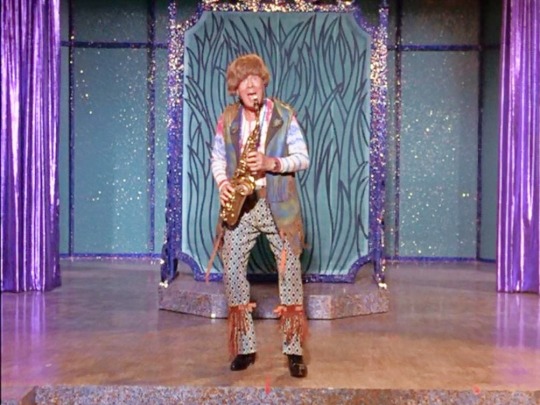
Leave a comment